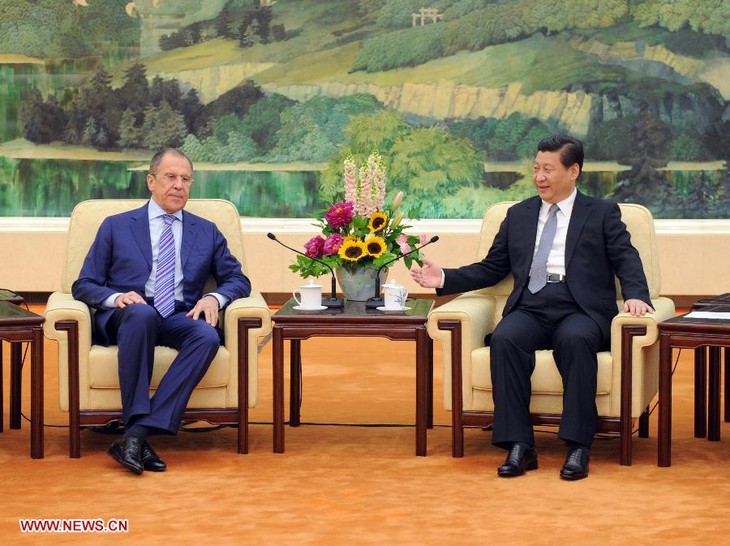(VOVworld) – Russian Foreign Minister Sergei Lavrov has paid a working visit to Beijing and met with his counterpart Wang Yi. Although it was an advance diplomatic activity prior to President Vladimir Putin’s visit to Russia next month, Lavrov’s visit has caught special attention from international political analysts because it took place as relations between Moscow and the West have grown tense over Ukraine. Moscow’s diplomatic moves are said to have implications other than strengthening diplomatic ties.
 |
Chinese President Xi Jinping met vith Russian Foreign Minister Sergei Lavrov in Beijing on April 15, 2014
|
At a meeting with his Chinese counterpart, Russian Foreign Minister Sergei Lavrov said the Russian-Chinese strategic partnership is at a high level of mutual trust. The two sides agree that the biggest success in their bilateral relations has been trade cooperation. Despite an unfavorable global situation in 2013, trade between Russia and China totaled 88.8 billion USD. Bilateral investment has steadily increased, particularly Russia’s petroleum exports to China and China’s investment in gas exploitation along Russia’s continental shelf. Cooperation in defense and security has also progressed.
Analysts say Moscow’s main purpose is to enhance its eastward diplomatic influence, especially with China, as Russia and the West become bogged down in a new cold war triggered by events in Ukraine.
Striving to gain influence
The Ukrainian crisis has pushed Russia and the US into a new cold war and their worst confrontation since the collapse of the Soviet Union in 1991. China becomes the third most important country and both the US and Russia care about how China lines up. Lavrov’s key task is to seek Beijing’s support.
Analysts say Moscow has the advantage because Russia and China have many economic and political similarities. These two permanent members of the UN Security Council are close allies on a number of global issues in Syria, Iran, and the Democratic People’s Republic of Korea.
Since the Ukrainian crisis broke out in late 2013, the Chinese media have tended to criticize the West for causing instability and said Putin’s decision to protect its citizens was understandable. After Russia sent troops to Crimea, China urged relevant parties to resolve disputes legally and peacefully. China partially showed its stance in the Ukrainian issue through its abstention in the UN Security Council’s vote over Crimea’s annexation to Russia in March.
During his visit to Beijing, Lavrov affirmed that Russia appreciated China’s objective and unbiased stance in Crimea’s annexation to Russia. He said Beijing has showed its thorough understanding of historical condition in assessing the Ukrainian crisis.
Forming a new work order
The Ukrainian situation is complicated and may cause shift in the world order. The West’s effort to isolate Russia will push Russia and China closer to each other, which the US will not like.
Although Russian-Chinese relations have a complicated history, they may find the motivation to form a new coalition to balance the US. Moscow and Beijing are discussing a deal to supply petroleum from Russia to China for 30 years which will be decided during President Putin’s visit to China in May. If the deal is inked, Russian-Chinese relations will compensate Russia for losses caused by the US sanctions.
Lavrov’s visit to Beijing has met with some success. Beijing’s neutral attitude may be favorable for Moscow at the 4-sided Ukraine meeting in Geneva on April 17th.